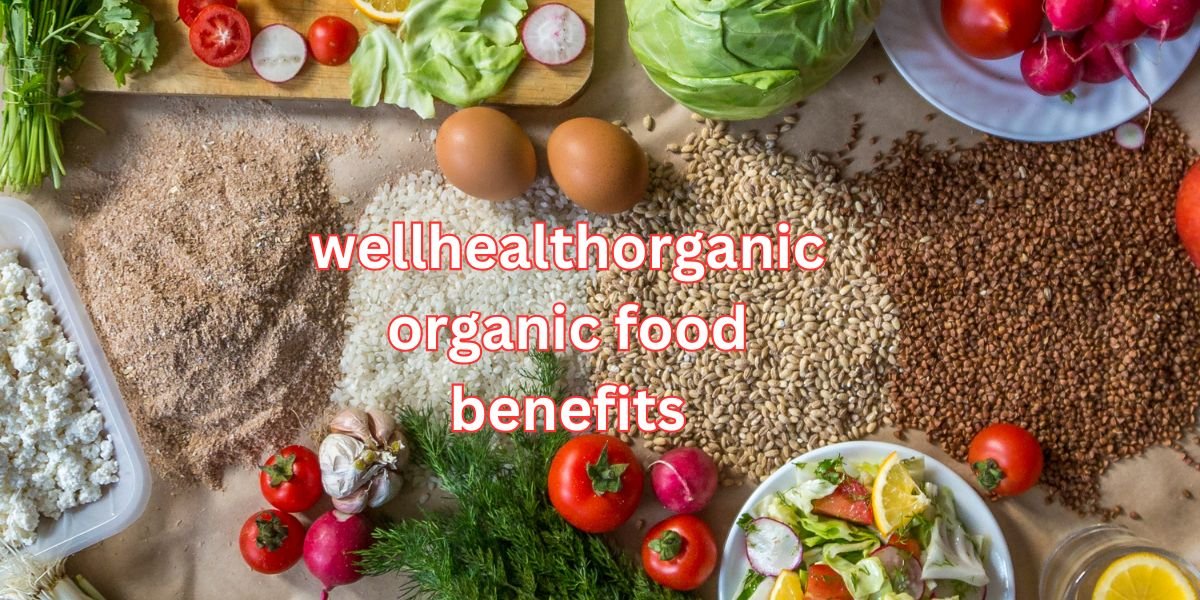The wellhealthorganic organic food benefits has gained massive popularity in recent years due to its numerous health benefits and eco-friendly farming practices. By opting for organic options, consumers can enhance their well-being while supporting sustainable agricultural systems. This blog article dives into the top 10 wellhealthorganic organic food benefits and explores the differences between organic and locally-grown food, helping you make more informed choices for your health and lifestyle.
What is Wellhealthorganic Organic Food & What are the Benefits?
The wellhealthorganic organic food refers to crops and livestock raised without synthetic fertilizers, harmful pesticides, or genetically modified organisms (GMOs). These foods are grown through environmentally sustainable farming practices that prioritize soil health and biodiversity. Choosing organic food reduces exposure to toxins and ensures that you consume natural, nutrient-dense produce free from artificial additives. Beyond personal health, organic farming helps preserve the environment, ensuring a healthier planet for future generations. Additionally, organic pet food benefits your furry companions by providing them with healthier, additive-free nutrition.
Read Also: The Vegetable & Fruits wellhealthorganic.com : Eat Your Peels: Unlocking the Nutritional Benefits
Top 10 Health Benefits of Organic Food | wellhealthorganic Organic Food Benefits
1. Rich in Nutrients
Organic foods are often more nutrient-dense than conventional alternatives. Studies indicate that they may contain up to 50% more antioxidants, essential vitamins, and minerals, providing a significant boost to overall health and disease prevention.
2. Free from Harmful Chemicals
Unlike conventional produce, organic food is grown without harmful pesticides or herbicides. This ensures that consumers avoid exposure to toxins that can accumulate in the body and lead to long-term health risks.
3. Boosts Immune System
Consuming organic food strengthens the immune system by eliminating exposure to harmful chemicals while supplying high-quality nutrients that enhance the body’s natural defenses.
4. Better Taste
The flavor of organic food is often superior to that of conventional options. Because these products are cultivated in nutrient-rich soil and without artificial additives, their natural taste shines through.
5. Supports Heart Health
Organic dairy and meat are rich in omega-3 fatty acids, which promote cardiovascular health. These products provide healthier fat profiles compared to conventionally raised animals.
6. Hormone-Free
Organic livestock is raised without synthetic hormones or antibiotics, reducing the risk of hormonal imbalances or related health problems in humans. This makes organic dairy, meat, and eggs safer options for your diet.
7. Reduces Risk of Disease
By lowering exposure to carcinogenic chemicals, organic food helps reduce the risk of chronic diseases, including cancer, while promoting better overall health.
8. Safe for Children
Children are more vulnerable to the harmful effects of pesticides. Organic food is a safer choice for young, developing bodies, ensuring they grow healthily without exposure to harmful chemicals.
9. Environmentally Friendly
Organic farming is better for the environment, as it promotes biodiversity, conserves water, and avoids pollution caused by chemical fertilizers. Supporting organic agriculture helps protect the planet.
10. Reduces Allergies
Organic food is less likely to trigger allergies due to the absence of artificial preservatives, additives, and synthetic chemicals commonly found in processed foods.
Read Also: Top Ways Wellhealthorganic.com : White Hair Easy Ways to Prevent it Tips and Home Remedies
Best Examples of wellhealthorganic Organic Food Benefits
Some of the best examples of organic foods include fresh produce like apples, spinach, kale, and berries, which are packed with antioxidants and essential nutrients. Organic dairy products such as milk, cheese, and yogurt come from animals raised without antibiotics, making them healthier options. Similarly, organic meats like grass-fed beef and free-range chicken provide cleaner, nutrient-rich protein sources. Organic grains and legumes such as quinoa, brown rice, and lentils are also excellent staples for any diet.
Organic Food vs. Locally-Grown Food
Many people confuse organic food with locally-grown food, but they are different. Organic food is grown using strict farming methods that exclude synthetic chemicals, while locally-grown food focuses on minimizing transportation and supporting regional farmers. For example, organic food might travel longer distances to reach your local supermarket, but it guarantees that the produce is free of synthetic pesticides and GMOs. Locally-grown food, on the other hand, is often fresher and has a smaller carbon footprint due to shorter transportation times. Combining both organic and locally-grown food ensures the best of both worlds for health and sustainability.
| Criteria | Organic Food | Locally-Grown Food |
|---|---|---|
| Farming Methods | Grown without synthetic pesticides, fertilizers, or GMOs | Can be grown conventionally or organically |
| Certification | Requires strict organic certification | No specific certification needed |
| Environmental Impact | Promotes soil health, water conservation, and biodiversity | Lower carbon footprint due to reduced transportation |
| Availability | May travel longer distances to reach consumers | Typically sold within a short distance of the farm |
Does Organic Mean Pesticide-Free?
Organic doesn’t necessarily mean pesticide-free, but it does ensure that any pesticides used are natural and minimally harmful. Organic farmers utilize plant-based or mineral-derived pesticides that are carefully regulated to ensure safety for both humans and the environment. This means you can enjoy peace of mind when consuming organic food, knowing it poses significantly fewer health risks.
Read Also: Top 6 Best Way to wellhealthorganic.com : remove dark spots on face tang
Online Shops to Buy Organic Food
Purchasing organic food is now more convenient than ever, thanks to online platforms. Trusted stores like Wellhealthorganic offer a wide variety of organic products at affordable prices. Other reliable options include Thrive Market, a membership-based store with an extensive selection of organic goods, and Whole Foods Market, which is renowned for its high-quality organic offerings. Platforms like Farmbox Direct and iHerb also deliver fresh organic products straight to your door, making it easy to maintain a healthy diet.
Read Also: Michujobs Makes It Easy to Get Your Dream Job
Price Comparison for wellhealthorganic Organic Food Benefits
While organic food may seem more expensive, its long-term health benefits justify the cost. Below is a comparison of prices for some common organic and conventional food items:
| Item | Organic Price (per lb) | Conventional Price (per lb) |
|---|---|---|
| Apples | $2.99 | $1.49 |
| Spinach | $3.49 | $1.99 |
| Chicken Breast | $6.99 | $3.49 |
| Milk (gallon) | $5.99 | $2.99 |
Investing in organic food can save you from long-term healthcare costs by reducing your risk of chronic diseases and ensuring optimal health.
Conclusion
Organic food offers undeniable benefits for both health and the environment. From being nutrient-rich to reducing exposure to harmful chemicals, organic options contribute to overall well-being and sustainability. Whether you choose wellhealthorganic organic food benefits by all products or other trusted organic brands, incorporating these foods into your diet is a worthwhile step toward healthier living. While organic food may cost slightly more, the advantages far outweigh the price, making it an essential investment in your health and the planet.













